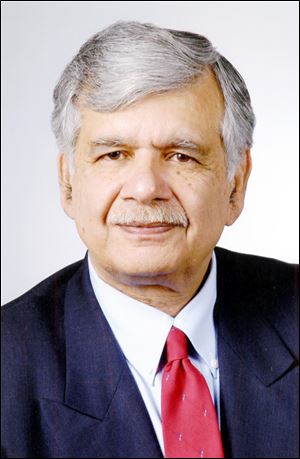
COMMENTARY
Reflections on a newly opened bud on the ancient tree of life
11/11/2013
Hussain
I traveled to California recently to meet a very special person: my newborn grandson, Alexander.
The anticipation of meeting him made me a bit nervous. The combination of anxiety and unfettered happiness on my face must have been apparent to people I came across during my journey west.
One such person was Metropolitan Nicholas, head of the Detroit diocese of the Greek Orthodox Church, whom I met at Detroit Metro Airport. He said I looked very happy.
He asked where I was going. When I told him the purpose of my journey, he remarked with a smile that it was written all over my face.
In that frame of mind I met Alexander, who greeted me with full-throated cries. I know crying is also an expression of happiness. I was charmed.
Eighteen years ago, I wrote a column to welcome my first grandchild, Hannah, into this world. I was in the snow-bound Himalayan town of Nathiagali in Pakistan when over a tenuous telephone connection I learned that I had become a nana, a maternal grandfather. I realized that babies have a way of filling the heart with joy and happiness across great distances.
I also learned that a tiny baby could fill an otherwise empty room or house with his or her presence, even when the infant is fast asleep. A baby commands attention and love.
I held Alexander and looked at him with wonder and amazement: random movements of his arms and legs, an occasional whimper, opening his eyes for a moment to make sure the world around him was still there, still secure.
These are signs of erratic, random brain activity, say the medical experts. To me, such movements are specifically designed by nature to excite and thrill grandparents and others, including parents.
I marvel at the cycles of life. Like the wild wind, life picks up seeds from one place and plants them in another, sometimes thousands of miles and many millennia away. It carries on its wings the legacies and traditions of hundreds of generations, the cumulative heritage of many, often diverse, people.
My ancestors moved from northern Iraq to the Indian subcontinent in the early 1600s. They settled in the dusty little frontier town of Peshawar, in the northwest corner of British India. That fertile soil would nourish and nurture the family for more than 150 years.
The ramshackle house, our homestead, within the walled city was the place to which we returned time and again to reaffirm ourselves and celebrate our togetherness. At any time, 15 to 20 members of the extended family, occasional guests, and a few cousins from the countryside lived there.
It was our village into which 26 children, spanning three generations, were born and raised. For 150 years, it was our stable island during good times and bad. When we moved away, we took albums of rich memories and an enduring legacy of belonging and togetherness.
These thoughts were on my mind when I had held my other two grandchildren. Now that I held Alexander, I realized that he too is the repository of disparate people.
They include galloping horsemen on the windswept steppes of Asia, nomads of Mesopotamia, dwellers in the Indus Valley, early European settlers on this continent, and nomadic tribes from the ancient land of Palestine. He would, like his cousins, Hannah and Kevin, never know for sure the wealth of his ancestors’ legacy. But that legacy is passed on and continues.
He will carry those legacies with him and pass them on to his own children. He is, like his cousins, an important link in a long chain that connects the past with the future.
A poet friend of mine, when I told him of my meeting with Alexander, wrote this haiku:
Newly opened bud
On the ancient tree of life
Our eyes meet, hearts beat.
A newborn baby is a jumble of so many things it boggles the mind. As a saying goes: A baby makes love stronger, days shorter, nights longer, a bankroll smaller, a home happier, clothes shabbier, the past forgotten, and the future worth living for.
It is a beautiful state of mind to be in.
Dr. S. Amjad Hussain is a retired Toledo surgeon whose column appears every other week in The Blade.
Contact him at: aghaji@bex.net